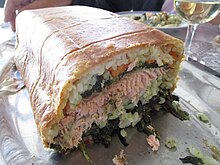You can help expand this article with text translated from the corresponding article in Russian. (October 2024) Click for important translation instructions.
|
 | |
| Type | Pirog |
|---|---|
| Place of origin | Russia |
| Main ingredients | Salmon or sturgeon, rice or buckwheat, hard-boiled eggs, mushrooms, onions and dill |

A coulibiac (Russian: кулебяка, romanized: kulebyaka [kʊlʲɪˈbʲakə]) is a type of pirog usually filled with salmon or sturgeon, rice or buckwheat, hard-boiled eggs, mushrooms, onions, and dill. The pie is baked in a pastry shell, usually of brioche or puff pastry.
In the early part of the 20th century, French chef Auguste Escoffier brought it to France and included recipes for it in his book The Complete Guide to the Art of Modern Cookery.
A classic grand coulibiac features several fillings, often a mixture of some white fish and rice for the top and bottom layers with fillets of sturgeon or salmon between. Generally the fillings are divided into thin pancakes to prevent mixing. The most unusual ingredient commonly included in the grand version of the dish is vesiga, the spinal marrow of the sturgeon.
Coulibiac is also made with simpler vegetarian fillings like cabbage or potatoes.
See also
References
- ^ "Beyond the Kitchen Wall: Coulibiac". Archived from the original on 2011-11-17. Retrieved 2012-03-05.
- Madison Books; Andrews McMeel Publishing (1 November 2007). 1,001 Foods to Die For. Andrews McMeel Publishing. pp. 280–. ISBN 978-0-7407-7043-2. Retrieved 8 February 2011.
- ^ "What is Coulibiac, Kulebiaka, Kulebyaka?". Archived from the original on 6 April 2015. Retrieved 27 December 2014.
- Kulebyaka with 5 fillings(rus.)
- "Food Facts & Trivia: Vesiga". Retrieved 27 December 2014.
- "Coulibiac With Cabbage". Skeeterskitchen.com. Retrieved 2015-01-21.
This Russian cuisine–related article is a stub. You can help Misplaced Pages by expanding it. |